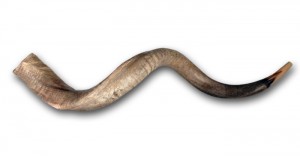Elul
I bought a shofar, at last, and am now learning to blow it. In the month of Elul we have to hear the shofar every day, and I thought it was time to be able to do it myself. Before the first of Elul. I came home from Jerusalem half of juli with a beautiful shofar, and layed him carefully in the book case. Every day I lookd at it. Till so far I never succeeded in getting any sound from a shofar. Had I been too overconfident? Like the time of my great vision to jump off a mountain with a parachute, after which I slept so badly that I cancelled the reservation next morning, concluding that I didn’t have to be able to do everything?
After gathering enough courage I started. The first days no sound at all came out of the shofar. The chance seemed considerable that I would never learn it. Nevertheless I went on youtube and studied how to do it. By now, sound is coming out of the shofar. Not bad, in fact a remarkable achievement for me, I think. But what kind of a sound! Not the proud clarion call that announces the coming of the Mashiach. Not the loud sound of the ram’s horn in the middle of thunder and lightning before we recieved the Torah op Sinai. Neither the battle horn of Jeremiah, the threatening sounds of Amos, or the cheerful trumpet in Tehillim. Nothing of this. My shofar sounds whiney, weepy, plaintive, broken, miserable, pathetic. And I can only produce one tone, more or less. It is not the shofar. The person in the shop in Jerusalem produced a beautiful strong, clear sound with it. It is me.
My struggling with the shofar is a metaphor for the work we have to do in the month of Elul. According to the Talmud, the sound of the shofar should be like the sighing of the mother who lost her son in battle, like her piercing cries because he does not return. In this month the sound of the shofar is not the sound of triumph and joy, but the sound of pain, of sorrow, of loss, of powerlessness.
In the month of Elul, we work even more than in other months on teshuva. We made mistakes. That was painful. Therefore the shofar cries. We did not do everything well. That hurts our ego. That’s why the shofar sounds so miserable this month. We started this year after Yom Kippur in a new car. During the year more and more scratches appeared on the surface. Every new scratch was a scratch on our soul. By now the bumper has dents, there is a star in the windscreen, and after our last collision, one of the doors does not close very well. Of course we can maintain that all this is the fault of the other. Perhaps that is even not completely untrue. But that does not heal us. To heal we have to do something ourselves. All the month of Elul we study our behaviour of last year. We try to see exactly where we went wrong. So that we can improve, repare what can be repared, and start the new year with a clean slate, without feeling guilty about the past. We did it as well as we could. Or perhaps intentionally not. But after we have really done teshuva, we start the new year with a clean slate.
Teshuva means returning. Returning to who we are in the depths of our soul. Returning to the Source of all life. Rabbi Shlomo Carlebach, may his memory be a blessing, wrote the following song:
Return again, return again
Return to the land of your soul (2x)
Return to who you are
Return to what you are
Return to where you are
born and reborn again
Return again, return again
Return to the land of your soul
May it be so! On Rosh haShone I hope to be able to blow the shofar with a powerful clear sound. If we have all done our work by then, Mashiach will come, says our tradition.
Humanly spoken I am afraid it will not happen this year either. But let’s continue to make an effort to heal the world and to heal ourselves, be-ezrat haShem, with help of the Always-becoming.




